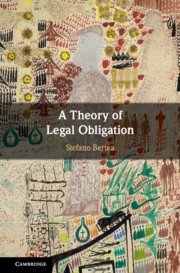Book contents
- A Theory of Legal Obligation
- A Theory of Legal Obligation
- Copyright page
- Dedication
- Contents
- Acknowledgements
- Introduction
- 1 The Concept of Obligation
- 2 Contemporary Approaches to Legal Obligation
- 3 The Social Practice Account
- 4 The Interpretivist Account
- 5 The Conventionalist Reason Account
- 6 The Exclusionary Reason Account
- 7 A Revisionary Kantian Conception
- 8 Further Dimensions of the Revisionary Kantian Conception
- 9 The Robust Reason Account
- 10 The Method of Presuppositional Interpretation
- Conclusion
- Index
6 - The Exclusionary Reason Account
Published online by Cambridge University Press: 20 September 2019
- A Theory of Legal Obligation
- A Theory of Legal Obligation
- Copyright page
- Dedication
- Contents
- Acknowledgements
- Introduction
- 1 The Concept of Obligation
- 2 Contemporary Approaches to Legal Obligation
- 3 The Social Practice Account
- 4 The Interpretivist Account
- 5 The Conventionalist Reason Account
- 6 The Exclusionary Reason Account
- 7 A Revisionary Kantian Conception
- 8 Further Dimensions of the Revisionary Kantian Conception
- 9 The Robust Reason Account
- 10 The Method of Presuppositional Interpretation
- Conclusion
- Index
Summary
The subject matter of Chapter 6 is the exclusionary reason account. In engaging with the exclusionary version of the reason account of legal obligation, I will be almost exclusively concerned with the work of John Finnis. In my critical assessment of Finnis’s theory of legal obligation, I will argue that such theory marks a significant advance over the accounts discussed in the previous chapters. Nonetheless, it can be criticized on two grounds. On the one hand, it claims that the force of legal obligation is invariant. Contrary to that view, I will argue that the obligations arising out of the law are defeasible requirements, and that as such they have variable force. On the other hand, whilst Finnis is committed to the thesis that legal obligation can be adequately characterized in terms of the notion of an exclusionary reason, I will maintain that it cannot, since legal obligation stands in a dialectical (or inclusionary, as opposed to exclusionary) relation to the fundamental demands of practical rationality.
- Type
- Chapter
- Information
- A Theory of Legal Obligation , pp. 164 - 198Publisher: Cambridge University PressPrint publication year: 2019

